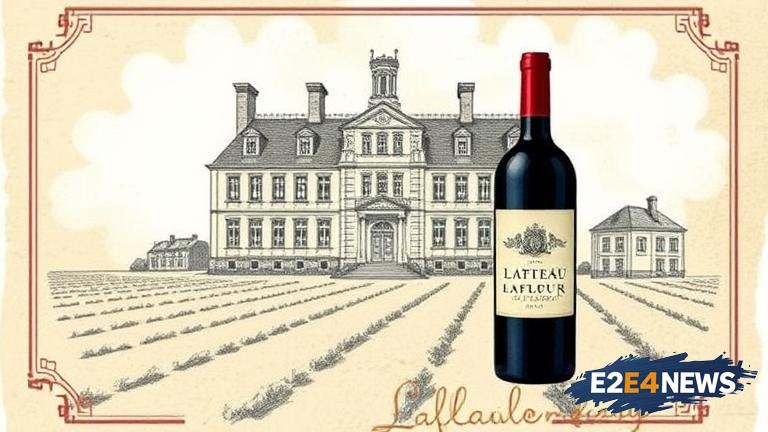In a shocking move, Chateau Lafleur, a prestigious Bordeaux wine estate, has announced its withdrawal from the appellation system. This decision has sent ripples throughout the wine industry, with many experts and enthusiasts weighing in on the implications. The appellation system, which is a set of rules and regulations that govern the production of wine in specific regions, has been a cornerstone of the French wine industry for centuries. By withdrawing from the system, Chateau Lafleur is essentially opting out of the traditional framework that has guided Bordeaux wine production for generations. The estate’s owner, Sylvie Guinaudeau, cited a desire for greater flexibility and freedom in winemaking as the reason for the withdrawal. This move is seen as a significant departure from the traditional approach to winemaking in Bordeaux, where the appellation system has long been seen as a guarantee of quality and authenticity. Chateau Lafleur’s decision is likely to have far-reaching consequences for the wine industry, with some predicting that it could lead to a re-evaluation of the appellation system as a whole. Others have expressed concerns that the withdrawal could undermine the integrity of the Bordeaux wine region and its reputation for producing high-quality wines. Despite these concerns, Chateau Lafleur’s decision has also been seen as a bold move that could pave the way for innovation and experimentation in winemaking. The estate has long been known for its commitment to traditional winemaking methods, but its withdrawal from the appellation system suggests that it is now looking to push the boundaries of what is possible in Bordeaux. This move is likely to be closely watched by wine enthusiasts and industry experts alike, as it has the potential to reshape the landscape of the Bordeaux wine region. The appellation system has long been a source of pride for Bordeaux winemakers, who see it as a way of ensuring that their wines meet certain standards of quality and authenticity. However, some have argued that the system can be overly restrictive, limiting the ability of winemakers to experiment and innovate. Chateau Lafleur’s withdrawal from the system may be seen as a vote of no confidence in the appellation system, but it is also a testament to the estate’s commitment to producing high-quality wines that reflect its unique terroir and winemaking philosophy. As the wine industry continues to evolve and adapt to changing consumer preferences and market trends, it will be interesting to see how Chateau Lafleur’s decision plays out. Will other estates follow suit, or will Chateau Lafleur’s withdrawal from the appellation system be seen as a one-off? Only time will tell, but one thing is certain: this move has sparked a lively debate about the future of Bordeaux wine and the role of the appellation system in shaping the industry. The implications of Chateau Lafleur’s decision are far-reaching and complex, and it will likely take several years for the full impact to be felt. In the meantime, wine enthusiasts and industry experts will be watching with bated breath as the situation unfolds. Chateau Lafleur’s withdrawal from the appellation system is a significant development that has the potential to reshape the Bordeaux wine region and the wider wine industry. As the news continues to sink in, it is clear that this move will have a lasting impact on the world of wine. The estate’s decision to withdraw from the appellation system is a bold move that reflects its commitment to innovation and excellence in winemaking. While some have expressed concerns about the implications of this move, others see it as a positive development that could lead to greater flexibility and creativity in winemaking. As the wine industry continues to evolve, it will be interesting to see how Chateau Lafleur’s decision influences the development of Bordeaux wine and the wider wine industry. With its rich history and tradition of producing high-quality wines, Chateau Lafleur is well-placed to navigate the challenges and opportunities presented by its withdrawal from the appellation system. The estate’s owner, Sylvie Guinaudeau, has stated that the decision to withdraw from the system was not taken lightly, and that it reflects a desire to produce wines that are truly reflective of the estate’s unique terroir and winemaking philosophy. As the wine industry looks to the future, it is clear that Chateau Lafleur’s decision will be an important factor in shaping the development of Bordeaux wine and the wider wine industry. The appellation system has long been a cornerstone of the French wine industry, but Chateau Lafleur’s withdrawal suggests that it may not be the only way to produce high-quality wines. As the situation continues to unfold, it will be interesting to see how other estates respond to Chateau Lafleur’s decision, and whether it will lead to a wider re-evaluation of the appellation system. The implications of Chateau Lafleur’s decision are complex and far-reaching, and it will likely take several years for the full impact to be felt. In the meantime, wine enthusiasts and industry experts will be watching with interest as the situation develops. Chateau Lafleur’s withdrawal from the appellation system is a significant development that has the potential to reshape the Bordeaux wine region and the wider wine industry. With its commitment to innovation and excellence in winemaking, the estate is well-placed to navigate the challenges and opportunities presented by its decision. As the wine industry continues to evolve, it will be interesting to see how Chateau Lafleur’s decision influences the development of Bordeaux wine and the wider wine industry.
